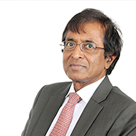
Anil Kumarsingh Gayan
Minister of Tourism
Tourism / Mauritius
“About 40% of our tourists are repeat visitors; this says a lot”
Mauritius’ exotic blend of diverse activities and cultures make it an unequalled luxury tourism destination, says Minister of Tourism Anil Kumarsingh Gayan.
How important is the tourism industry now for the island’s economy?
When Mauritius started off as a free state in 1968, we hardly had any tourism. Today tourism represents about 8% of GDP; we have more than 100 four- and five-star hotels in Mauritius, and we had 1.3 million tourists coming in 2017. We expect 1.4 million tourists to arrive in 2018, representing growth. This growth is supported by our rising air connectivity. Moreover, we are a multicultural destination, where people can come from any part of the world and very much feel at home. This is one of the great attractions of Mauritius.
How would you assess Mauritius’ global competitiveness as a tourism destination?
Each tourism destination is unique. The uniqueness of Mauritius is that within a very small area you can feel the impact of all religions and culture from all over the world. You can’t experience that in the Maldives for instance. Visitors to Mauritius often come back in fact, because it’s a destination where it’s easy to make friends. About 40% of our tourists are repeat visitors; this says a lot about the quality of the welcome that people give to visitors.
How is the country working to promote better connectivity from Mauritius?
We work very closely with all the airlines, including Air Mauritius, which is a very important partner for the tourism industry. Today we have about 23 airlines coming to Mauritius, which isn’t bad for a very small country. We are still looking at improving our air connectivity, which is essential for the tourism industry.
What are your plans to diversifying the tourism industry?
Mauritius hopes to get the sovereignty over the Chagos archipelago, which covers over 100 islands, a case we have taken to the international courts. Once we do, we will be able to develop these islands for eco-tourism or other purposes. We are also planning to develop tourism in other islands of the Indian Ocean that belong to Mauritius. We believe that many tourists come to Mauritius for the beach and the sun, but we also want to develop eco-tourism in the beach and the mountains, where people can have a great hunting holiday as well, as we have a great hunting season here.
What are your present priorities for development?
Our priority at the time being is to tap into the Chinese market. China represents a huge potential, and we are able to offer to the Chinese something that they will never be able to find in the Seychelles or Maldives. Due to the former colonization of Mauritius, we have a very vibrant Chinese community with a China town. Mauritius has very much maintained its Chinese tradition and culture over the years and celebrates Chinese New Year as a national holiday.
What is your vision for development and change during the next 50 years in Mauritius?
I think ocean economy would be the next economic frontier for Mauritius development. Tourism will continue to develop and we will emerge as the best destination in the Indian Ocean for diversified activities (including casinos, entertainment, theaters, etc). We are in fact renovating two theaters here in order to attract artists.
How do you plan to develop the MICE industry?
We have the facilities, however the issue is that all hotels are scattered on the coasts, making it difficult to centralize everything. So going forward I would like to set up conference infrastructure nearby these hotels. Along with the MICE industry, other developments will come such as restaurants and nightlife; so we are poised for big developments in that area.
What are the top five things visitors should know about Mauritius?
First, I’d like to say the diversity and friendliness of the people. To visitors I would say don’t be afraid to go to somebody’s house and have a cup of tea. Secondly, I believe the safety of the destination, including in terms of health as well, as you can try street food with no fear or risk in Mauritius. And then just feel Mauritian.
